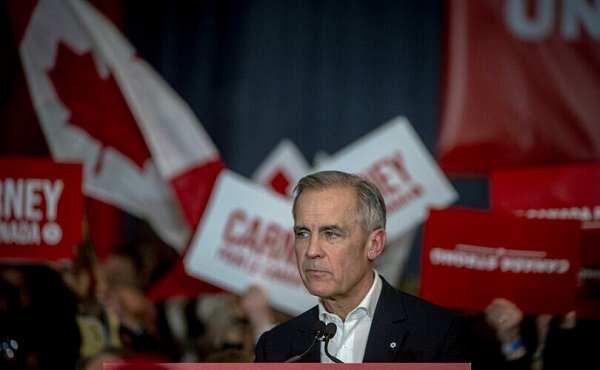Alberta
Report commissioned by Alberta’s Smith calls for end to COVID shots for healthy minors

From LifeSiteNews
A 269-page report commissioned by Alberta Premier Danielle Smith has recommended halting the use of the COVID vaccines in healthy children and teenagers.
A report commissioned by Alberta Premier Danielle Smith to investigate the previous administration’s handling of COVID-19 was released to the public late last week and included a recommendation to immediately halt the experimental jabs for healthy children and teenagers.
The Alberta COVID-19 Pandemic Data Review Task Force’s “COVID Pandemic Response” 269-page final report was released last Friday, recommending the halting of “the use of COVID-19 vaccines without full disclosure of their potential risks” as well as outright ending their use “for healthy children and teenagers as other jurisdictions have done,” mentioning countries like “Denmark, Sweden, Norway, Finland, and the U.K.”
The report also called for “[f]urther research to establish the safety and efficacy of COVID-19 vaccines is necessary before widespread use in adults and children,” the establishment of “a website and/or call-in center for the vaccine injured in Alberta” as well as establishing a “mechanism for opting out of federal health policy until provincial due process has been satisfied.”
The task force also found that the COVID jabs were not “designed to halt transmission” and that there is a “lack of reliable data showing that the vaccines protect children from COVID-19.”
“The Task Force found that the risk of severe COVID-19 infection or death is primarily associated with age, with the elderly being most at risk,” reads the report.
“Children and teenagers have a very low risk of serious illness from COVID-19. COVID-19 vaccines were not designed to halt transmission and there is a lack of reliable data showing that the vaccines protect children from severe COVID-19.”
The report was released with no fanfare nor mention from any Alberta government official, perhaps suggesting that officials do not want to draw attention to the report.
The report was compiled by a panel of physicians and others in the health services sector. It was headed by Dr. Gary Davidson, who served as the former chief of emergency medicine at the Red Deer Regional Hospital Centre.
When it comes to the COVID shots, the task force found “deaths” and “injuries” related to the jabs.
“In terms of safety, the task force identified reports of deaths and injuries attributed to the vaccines, as well as a known risk of myocarditis, particularly in young males,” reads the report.
“The long-term safety of the vaccines is undetermined due to their rapid deployment and limited follow-up.”
The review of the COVID jabs in Alberta found that careful assessment of “risks and benefits, transparency, and individual choice in decision-making are vital for any future pandemic response vaccination initiative.”
It is worth noting that Alberta Health Services (AHS) is still promoting the COVID shots for babies as young as six months old.
The report stated that its main goal was to examine the “quality, use, interpretation, and flow of information and data that informed Alberta’s pandemic response to COVID-19.”
Smith, who spoke out against COVID jab mandates early in her term as premier, gave the task force a sweeping mandate last year to look at whether the “right data” was obtained during COVID and to assess the “integrity, validity, reliability and quality of the data/information used to inform pandemic decisions” by members of AHS.
Smith took over from Jason Kenney as leader of the UCP and premier on October 11, 2022, after winning the leadership of the party. The UCP then won a general election in May 2023. Kenney was ousted due to low approval ratings and for reneging on promises not to lock Alberta down during COVID.
After assuming her role as premier, Smith promptly fired the province’s top doctor, Deena Hinshaw, and the entire AHS board of directors, all of whom oversaw the implementation of COVID mandates.
Under Kenney, thousands of nurses, doctors, and other healthcare and government workers lost their jobs for choosing to not get the jabs, leading Smith to say – only minutes after being sworn in – that over the past year the “unvaccinated” were the “most discriminated against” group of people in her lifetime.
Thus far, Smith has not commented on the findings of the report.
Report critical of provincial response to COVID, notes masks were not ‘effective’
The task force concluded that it found a “critical failure of Alberta’s health system,” sharing concerns about how information was shared and developed during the COVID pandemic.
The report also noted that face masks, including both N95 and surgical masks, were not effective in stopping respiratory illness, and that there is a “weak evidence base for the effectiveness of continuous masking in preventing respiratory illnesses, including COVID-19.”
“Alberta should acknowledge the absence of evidence showing continuous masking provides protection against respiratory illnesses, including COVID-19, and highlight the potential harms associated with masking,” reads the report.
The report emphasized that the “choice to wear a mask should be a personal medical decision, guided by informed consent.”
The report also criticized lockdown policies and Alberta’s medical regulatory colleges for not doing their “due diligence” when it came to looking at producing their own internal studies related to COVID.
LifeSiteNews has published an extensive amount of research on the dangers of the experimental COVID mRNA jabs, which include heart damage and blood clots.
The mRNA shots have also been linked to a multitude of negative and often severe side effects in children and all have connections to cell lines derived from aborted babies.
Alberta
Alberta takes big step towards shorter wait times and higher quality health care

From the Fraser Institute
On Monday, the Smith government announced that beginning next year it will change the way it funds surgeries in Alberta. This is a big step towards unlocking the ability of Alberta’s health-care system to provide more, better and faster services for the same or possibly fewer dollars.
To understand the significance of this change, you must understand the consequences of the current (and outdated) approach.
Currently, the Alberta government pays a lump sum of money to hospitals each year. Consequently, hospitals perceive patients as a drain on their budgets. From the hospital’s perspective, there’s little financial incentive to serve more patients, operate more efficiently and provide superior quality services.
Consider what would happen if your local grocery store received a giant bag of money each year to feed people. The number of items would quickly decline to whatever was most convenient for the store to provide. (Have a favourite cereal? Too bad.) Store hours would become less convenient for customers, alongside a general decline in overall service. This type of grocery store, like an Alberta hospital, is actually financially better off (that is, it saves money) if you go elsewhere.
The Smith government plans to flip this entire system on its head, to the benefit of patients and taxpayers. Instead of handing out bags of money each year to providers, the new system—known as “activity-based funding”—will pay health-care providers for each patient they treat, based on the patient’s particular condition and important factors that may add complexity or cost to their care.
This turns patients from a drain on budgets into a source of additional revenue. The result, as has been demonstrated in other universal health-care systems worldwide, is more services delivered using existing health-care infrastructure, lower wait times, improved quality of care, improved access to medical technologies, and less waste.
In other words, Albertans will receive far better value from their health-care system, which is currently among the most expensive in the world. And relief can’t come soon enough—for example, last year in Alberta the median wait time for orthopedic surgeries including hip and knee replacements was 66.8 weeks.
The naysayers argue this approach will undermine the province’s universal system and hurt patients. But by allowing a spectrum of providers to compete for the delivery of quality care, Alberta will follow the lead of other more successful universal health-care systems in countries such as Australia, Germany, the Netherlands and Switzerland and create greater accountability for hospitals and other health-care providers. Taxpayers will get a much better picture of what they’re paying for and how much they pay.
Again, Alberta is not exploring an untested policy. Almost every other developed country with universal health care uses some form of “activity-based funding” for hospital and surgical care. And remember, we already spend more on health care than our counterparts in nearly all of these countries yet endure longer wait times and poorer access to services generally, in part because of how we pay for surgical care.
While the devil is always in the details, and while it’s still possible for the Alberta government to get this wrong, Monday’s announcement is a big step in the right direction. A funding model that puts patients first will get Albertans more of the high-quality health care they already pay for in a timelier fashion. And provide to other provinces an example of bold health-care reform.
Alberta
Alberta’s embrace of activity-based funding is great news for patients

 From the Montreal Economic Institute
From the Montreal Economic Institute
Alberta’s move to fund acute care services through activity-based funding follows best practices internationally, points out an MEI researcher following an announcement made by Premier Danielle Smith earlier today.
“For too long, the way hospitals were funded in Alberta incentivized treating fewer patients, contributing to our long wait times,” explains Krystle Wittevrongel, director of research at the MEI. “International experience has shown that, with the proper funding models in place, health systems become more efficient to the benefit of patients.”
Currently, Alberta’s hospitals are financed under a system called “global budgeting.” This involves allocating a pre-set amount of funding to pay for a specific number of services based on previous years’ budgets.
Under the government’s newly proposed funding system, hospitals receive a fixed payment for each treatment delivered.
An Economic Note published by the MEI last year showed that Quebec’s gradual adoption of activity-based funding led to higher productivity and lower costs in the province’s health system.
Notably, the province observed that the per-procedure cost of MRIs fell by four per cent as the number of procedures performed increased by 22 per cent.
In the radiology and oncology sector, it observed productivity increases of 26 per cent while procedure costs decreased by seven per cent.
“Being able to perform more surgeries, at lower costs, and within shorter timelines is exactly what Alberta’s patients need, and Premier Smith understands that,” continued Mrs. Wittevrongel. “Today’s announcement is a good first step, and we look forward to seeing a successful roll-out once appropriate funding levels per procedure are set.”
The governments expects to roll-out this new funding model for select procedures starting in 2026.
* * *
The MEI is an independent public policy think tank with offices in Montreal, Ottawa, and Calgary. Through its publications, media appearances, and advisory services to policymakers, the MEI stimulates public policy debate and reforms based on sound economics and entrepreneurship.
-

 John Stossel2 days ago
John Stossel2 days agoGovernment Gambling Hypocrisy: Bad Odds and No Competition
-

 2025 Federal Election2 days ago
2025 Federal Election2 days agoMark Carney’s radical left-wing, globalist record proves he is Justin Trudeau 2.0
-

 2025 Federal Election1 day ago
2025 Federal Election1 day agoFifty Shades of Mark Carney
-

 2025 Federal Election2 days ago
2025 Federal Election2 days agoMark Carney pledges another $150 million for CBC ahead of federal election
-

 Alberta2 days ago
Alberta2 days agoAlberta’s embrace of activity-based funding is great news for patients
-

 2025 Federal Election1 day ago
2025 Federal Election1 day agoCommunist China helped boost Mark Carney’s image on social media, election watchdog reports
-

 2025 Federal Election13 hours ago
2025 Federal Election13 hours agoRCMP memo warns of Chinese interference on Canadian university campuses to affect election
-

 2025 Federal Election2 days ago
2025 Federal Election2 days agoDon’t double-down on net zero again










